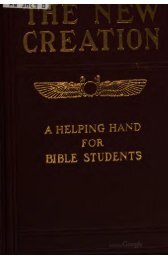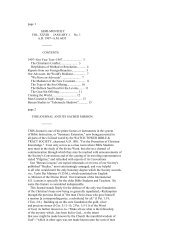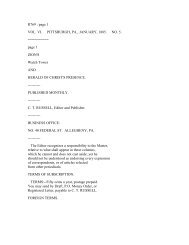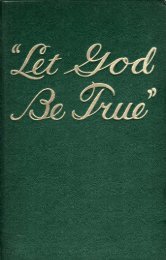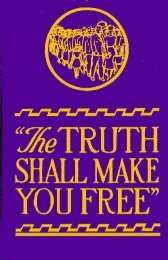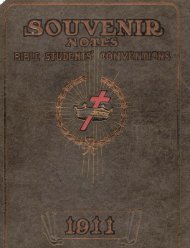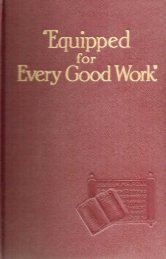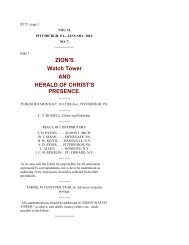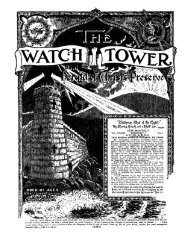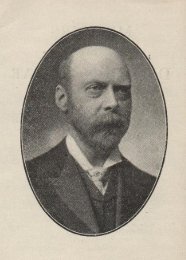- Page 3 and 4:
eight and ten times, with increasin
- Page 5 and 6:
fulfillment of God's plans, but the
- Page 7 and 8:
A meeting was held in the Baptist c
- Page 9 and 10:
Jordan in the far West, there came
- Page 11 and 12:
====================R1091 : page 3A
- Page 13 and 14:
ignorance and squalor, to comfort a
- Page 15 and 16:
of Christ and joint-heir with him o
- Page 17 and 18:
yet sit with him in his throne. But
- Page 19 and 20:
as Papacy, her ambition, sustained
- Page 21 and 22:
hiding and protection of Elector Fr
- Page 23 and 24:
Mark the oppression, and injustice,
- Page 25 and 26:
ejoicing in tribulations, and that
- Page 27 and 28:
POLITICS OF THE SAINTS.A Brother wh
- Page 29 and 30:
significant!], when the Son of man
- Page 31 and 32:
evening's diversion, a picnic, etc.
- Page 33 and 34:
Never speak slightingly of one to a
- Page 35 and 36:
Work, dear Christian mothers, with
- Page 37 and 38:
more truth, for she saw and deplore
- Page 39 and 40:
But they did not exclude me until I
- Page 41 and 42:
of interest among the readers upon
- Page 43 and 44:
SIN AND SICKNESS, "FAITH CURES," "P
- Page 45 and 46:
page 1DO NOT send us Foreign or Can
- Page 47 and 48:
indifferent to whatever testimony o
- Page 49 and 50:
the lunar time exactly, as the earl
- Page 51 and 52:
The bread used by the Lord was unle
- Page 53 and 54:
Those who may arrive on Sunday morn
- Page 55 and 56:
There is a very general misundersta
- Page 57 and 58:
called churches are not so recogniz
- Page 59 and 60:
(except in the beginning of the age
- Page 61 and 62:
NO. 4.AS BECOMETH WOMENPROFESSING G
- Page 63 and 64:
simple a way as you can. Inspire th
- Page 65 and 66:
neighbors are generally well again,
- Page 67 and 68:
period of Christ's Millennial reign
- Page 69 and 70:
worthy of this trial and to the wor
- Page 71 and 72:
sacrifice) for divine nature, it me
- Page 73 and 74:
torture, the case would be differen
- Page 75 and 76:
obedience to his commands, if he wo
- Page 77 and 78:
--IN REPLY--There are but two known
- Page 79 and 80:
we can get them out in large quanti
- Page 81 and 82:
not permitted to know sooner? Your
- Page 83 and 84:
I have enlisted in the service of t
- Page 85 and 86:
DEAR BRO. PATCHEN:--Your welcome le
- Page 87 and 88:
page 1DO NOT send us Foreign or Can
- Page 89 and 90:
The number present from abroad was
- Page 91 and 92:
Gethsemane and the inestimable valu
- Page 93 and 94:
EXTRACTS FROMINTERESTING LETTERS.pa
- Page 95 and 96:
E. C. LEIGH.Indianapolis, Ind., May
- Page 97 and 98:
people were much displeased with th
- Page 99 and 100:
who promise to read. Generally I pr
- Page 101 and 102:
The class to receive the prize is n
- Page 103 and 104:
of the human will into the will of
- Page 105 and 106:
purer tastes, until finally he give
- Page 107 and 108:
Brotherly kindness,Temperateness,Ch
- Page 109 and 110:
"If these things be in you and abou
- Page 111 and 112:
Of all this mass of "Stuff," but tw
- Page 113 and 114:
plan is so broad and comprehensive,
- Page 115 and 116:
how the new conditions, into which
- Page 117 and 118:
every matter, whether in our shorts
- Page 119 and 120:
elationships. Those whose ambitions
- Page 121 and 122:
of my pilgrimage have been few and
- Page 123 and 124:
celebrate Thee; they that go down i
- Page 125 and 126:
shown, water is a symbol of truth;
- Page 127 and 128:
poor starved sheep of Christ and th
- Page 129 and 130: CREDIT FOR THE POOR.Those unable to
- Page 131 and 132: page 1DAMAGED DAWNS.Our supply was
- Page 133 and 134: torment, either of themselves or th
- Page 135 and 136: living faith in the true Word of Go
- Page 137 and 138: his cause before an astonished worl
- Page 139 and 140: Sometimes we look into a face which
- Page 141 and 142: that the God-like element of sympat
- Page 143 and 144: change in his attitude toward his c
- Page 145 and 146: any continuance of life, in any oth
- Page 147 and 148: knowledge of God; as it is written:
- Page 149 and 150: upon all, will be released from the
- Page 151 and 152: shall be selected and given this ve
- Page 153 and 154: provided our ransom price; yea, he
- Page 155 and 156: Till thus relieved of this duty of
- Page 157 and 158: THE CHRISTIAN MINISTRY, NO. I.That
- Page 159 and 160: The world, then, being the portion
- Page 161 and 162: world admitted into any system of p
- Page 163 and 164: you; but that ye be perfectly joine
- Page 165 and 166: It follows that conceit springs fro
- Page 167 and 168: in order that he may thereby indire
- Page 169 and 170: VIEW FROM THE TOWER.Old readers wil
- Page 171 and 172: This conclusion, which we consider
- Page 173 and 174: SUFFER LITTLE CHILDREN--FORBID THEM
- Page 175 and 176: e sure that we give no occasion for
- Page 177 and 178: with none to molest and make us afr
- Page 179: R1138 : page 3Yours in Christ, Dr.
- Page 183 and 184: applied to themselves all the title
- Page 185 and 186: to the "clergy" by divine arrangeme
- Page 187 and 188: synods, as final settlements of the
- Page 189 and 190: may perform the service. [With some
- Page 191 and 192: While glad to acknowledge that Bapt
- Page 193 and 194: Dishonorable, ignoble, hypocritical
- Page 195 and 196: ====================R1139 : page 6C
- Page 197 and 198: y vergers, followed by their 'tail
- Page 199 and 200: correction. They were proud, and bo
- Page 201 and 202: general footing with all men and al
- Page 203 and 204: of the great reward, the grandest f
- Page 205 and 206: of God's dear Son, in meekness and
- Page 207 and 208: shall come forth with strong hearts
- Page 209 and 210: page 1When ordering MILLENNIAL DAWN
- Page 211 and 212: doubt; the struggle would be shorte
- Page 213 and 214: educe none to starvation wages, or
- Page 215 and 216: description. Men and women fought l
- Page 217 and 218: making a "willing sacrifice" of all
- Page 219 and 220: My health is too poor to permit me
- Page 221 and 222: ***R620 : page 3A little while, our
- Page 223 and 224: INTERNAL EVIDENCES.Those who will m
- Page 225 and 226: however, in the Greek, in the Sinai
- Page 227 and 228: and a few others seem to have been
- Page 229 and 230: eceive them with thankfulness as th
- Page 231 and 232:
writings. Origen, who wrote in the
- Page 233 and 234:
As for his historical writings, Mos
- Page 235 and 236:
notable--whose claims, if conceded,
- Page 237 and 238:
have been taken out, and "The Chris
- Page 239 and 240:
disavowal; content with employing i
- Page 241 and 242:
things new and old--meat in due sea
- Page 243 and 244:
WE SHOULD SAVE OURSELVES."Save your
- Page 245 and 246:
We thus rest in Him in the present
- Page 247 and 248:
R1152 : page 1VIEW FROM THE TOWER.K
- Page 249 and 250:
during the "dark ages," the majorit
- Page 251 and 252:
submit to it. Increase of knowledge
- Page 253 and 254:
well as the time and object of the
- Page 255 and 256:
I wish you could be. It quickens me
- Page 257 and 258:
Though dim as yet in tint and line,
- Page 259 and 260:
communication can reach the whole e
- Page 261 and 262:
seen by every living creature of ea
- Page 263 and 264:
locates it right here, saying, "At
- Page 265 and 266:
No; no, Brother Talmage, it is the
- Page 267 and 268:
and perfected men as the rulers, ex
- Page 269 and 270:
oldly, and if it is not true, why n
- Page 271 and 272:
Scriptures is while they yet hold o
- Page 273 and 274:
privations, persecutions and ignomi
- Page 275 and 276:
secure all that our hearts desire,
- Page 277 and 278:
each servant who desires to stand a
- Page 279 and 280:
R1151 : page 7CHRISTIAN INFLUENCE.T
- Page 281 and 282:
them, Verily, verily, I say unto yo
- Page 283 and 284:
there the opportunity of furnishing
- Page 285 and 286:
ut the plowing and seed sowing for
- Page 287 and 288:
R1431 : page 1DAWNS IN CLOTH BINDIN
- Page 289 and 290:
Hence muscle must and should be ser
- Page 291 and 292:
R1163 : page 2from purely benevolen
- Page 293 and 294:
The superiority of mind over muscle
- Page 295 and 296:
Christ Jesus, and whose members are
- Page 297 and 298:
Presbytery is one of the more notab
- Page 299 and 300:
interpreted." This agrees well with
- Page 301 and 302:
"Meantime, in the Presbyterian Chur
- Page 303 and 304:
Reporter.--"What are the special pa
- Page 305 and 306:
and chief divine agent in the work
- Page 307 and 308:
y a reporter of the Tribune, expres
- Page 309 and 310:
the Confession. Indeed, I find my s
- Page 311 and 312:
landlord, and the cultivators tenan
- Page 313 and 314:
with the public good. The species a
- Page 315 and 316:
"Looking now at the sphere of moral
- Page 317 and 318:
DRIVING SHARP BARGAINS.Selfishness
- Page 319 and 320:
means I might attain unto THE resur
- Page 321 and 322:
Missouri.TOWER TRACT SOCIETY:--I am
- Page 323 and 324:
J. H. DONNELON.Kansas.DEAR FRIENDS:
- Page 325 and 326:
I enclose an order to the TOWER CO.
- Page 327 and 328:
The terms to Colporteurs are as fol
- Page 329 and 330:
ought to have the aid which the Dia



